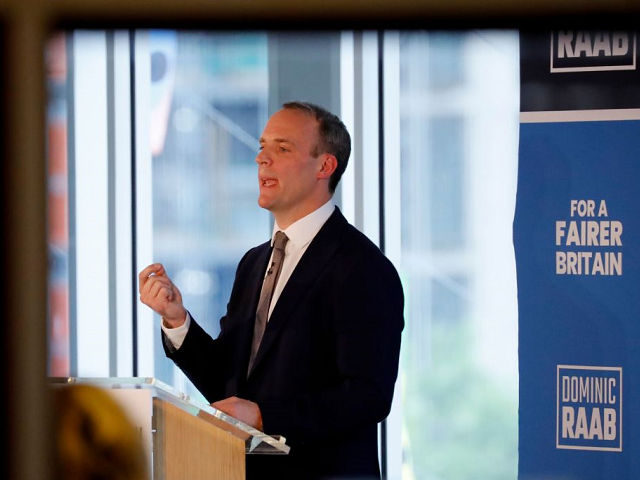Conservative leadership contender Dominic Raab has vowed to create a cabinet of Brexiteers, refusing to give a government job to any member of Parliament who wouldn’t accept that Britain is leaving the European Union in October.
Raab’s hardline approach to ensuring Brexit isn’t delayed again should he become party leader and, due to Britain’s Parliamentary system the Prime Minister as well, comes as his radical suggestion to prevent further Westminster interference in Brexit by closing Parliament temporarily got a boost on Tuesday.
Speaking at his campaign launch, Raab said of the common factor that would unite his theoretical cabinet was an understanding that the already significantly delayed 2019 Brexit date was sacrosanct. The Times reports his remarks when he said his core government team would be: “a cabinet reflecting the different views we have across our party but I would insist that this team is united in its resolve to deliver Brexit by the end of October.”
Tory Leadership Contender Dominic Raab Boasts Brexit Credentials, Swipes at Boris Johnson https://t.co/HpWLcgNmtJ
— Breitbart London (@BreitbartLondon) June 10, 2019
While a number of would-be Prime Ministers in the Conservative leadership race have said they would absolutely take Britain out of the European Union on October 31st, Mr Raab has caused some waves in Westminster by refusing to rule out the possibility of taking significant further steps to make sure that date was honoured.
One of the key roadblocks to the United Kingdom leaving the European Union is the House of Commons, which in defiance of the democratically expressed will of the British people is overwhelmingly anti-Brexit. While the House has failed to settle on any sort of Brexit it is willing to accept to at least give the impression of having given the British people what they asked for, it is absolutely certain it does not want the country to fully leave the Union with no strings attached.
A way to get around this which has been raised on a number of occasions and now has been linked to Mr Raab is what is known as ‘proroguing Parliament‘ — ending the present session. This brings an end to all Parliamentary business, with no debates or votes — leaving Members of Parliament powerless to stop Brexit.
Mr Raab said last week when asked of his views on prorogation: “I think it’s wrong to rule out any tool to make sure that we leave by the end of October.”
Raab: May Has Allowed UK to Be ‘Bullied and Blackmailed’ by Brussels, Brexit Deal ‘Fatally Flawed’ https://t.co/whaj6QR4dk
— Breitbart London (@BreitbartLondon) November 18, 2018
Anti-Brexit Conservative leadership contender Rory Stewart was so horrified at this suggestion he requested legal advice to confirm that the Prime Minister closing Parliament would be illegal, only to be told Tuesday morning by the government’s top lawyer that not only was it legal, it also had precedent. Attorney General Geoffrey Cox, a senior barrister paid to give the government independent advice and who attends cabinet, said this morning that suspending Parliament would not be illegal, but it would be unconstitutional and “improper”.
While Parliament is frequently prorogued by the Queen at the end of sessions, which typically last around a year, it was last prorogued in an exceptional sense in 1948. Ending the present session may seem extreme, but it is already the longest Parliament has ever sat for, surpassing the so-called ‘Long Parliament’ which sat during the English Civil War.
The Commons Library likens a parliamentary session to an academic year, and in recent history have typically lasted one year. The present session has already seen three calendar years, and is over twice as long as what was once considered normal in parliamentary convention.
Dominic Raab, who resigned as Brexit Secretary this morning, has told the BBC that May's draft Brexit deal is not only "damaging for the economy but devastating for public trust in our democracy." https://t.co/zBjn1CnlTg
— Breitbart London (@BreitbartLondon) November 15, 2018

COMMENTS
Please let us know if you're having issues with commenting.